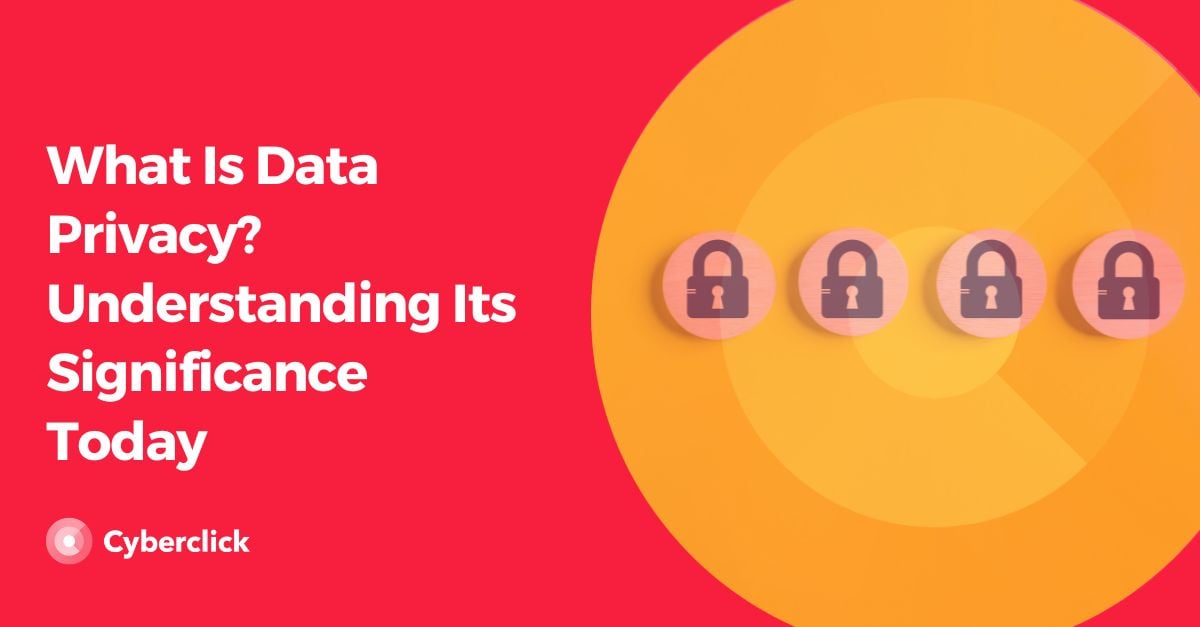At its core, data privacy refers to the rights and practices concerning the proper handling, consent, and use of personal information, ensuring that individuals' data is collected, processed, and shared in a manner that respects their privacy preferences and complies with applicable laws and regulations.
It ensures that personal data is accessed only by authorized individuals and used for its intended purpose. It also means that users can determine for themselves when, how and to what point data about them is shared and used.

In our increasingly digital world, the importance of data privacy has never been more pronounced. Every online interaction, from social media engagements to online purchases, generates data that, although invaluable to marketing strategies, can be vulnerable to misuse if not properly protected,
Data privacy encompasses a broad spectrum of personal information, ranging from basics like names and addresses to more sensitive data such as health records, financial information, and even behavioral data captured through online activities.
Privacy is a multifaceted issue that stands at the intersection of technology, law, ethics, and individual rights. In the digital age, understanding and upholding data privacy is not just a legal obligation but a moral imperative and a strategic business practice.
The Importance of Data Privacy Today
The digital revolution has transformed the way we live, work, and interact. While this has brought about numerous benefits, it has also raised significant privacy concerns. The sheer volume of data generated online has made personal information an invaluable commodity that is highly sought after by businesses as a source of income through targeted marketing, personalization efforts, and many other actions.
The significance of data privacy today lies in its fundamental link to personal freedom. Privacy is a cornerstone of individual liberty, allowing people to express themselves freely, make autonomous decisions, and protect themselves from undue influence or harm. The more sensitive information we handle online, the more fundamental this concept becomes, and the more aware users will be of its importance.
In the business realm, data privacy has profound implications for brand reputation and customer trust. Companies that fail to protect customer data risk not only legal consequences but also damaging their reputation, losing customer trust, and, ultimately, their competitive edge.
Data privacy is part of a more global term known as data protection, which encompasses traditional data protection, data privacy and data security. Although the terms are linked and sometimes confused, data security and data privacy are not the same thing. While Data security is concerned with protecting data from unauthorized access, breaches, and theft, data privacy is about ensuring that personal information is used in a fair, transparent, and accountable manner. Data privacy dictates how and why data should be used, while data security provides the tools and methods to protect that data from external threats and breaches.
Upholding data privacy in the digital era presents numerous challenges. The complexity of modern digital ecosystems makes it difficult to control the flow of information. Data collected by one entity can be shared, sold, and joined with other data sets, creating detailed profiles of individuals' lives without their explicit consent.
Data Privacy Regulations
In response to these challenges, various data privacy regulations have been enacted globally. The General Data Protection Regulation (GDPR) in the European Union, the California Consumer Privacy Act (CCPA) in the United States, and other similar laws worldwide aim to give individuals more control over their personal data and impose strict guidelines on data handlers.
In some countries, there are also privacy guidelines tailored to specific industries, such as the Health Insurance Portability and Accountability Act (HIPAA) in the United States, that sets the standards for managing personal healthcare information.
These regulations mandate transparency in data collection and usage, uphold individuals' rights to access and control their data, and enforce significant penalties for breaches, fundamentally changing how businesses approach data privacy. They can be quite complex and are frequently updated to stay relevant and in-line with users’ best interests. It is important to review them consistently and adjust your privacy measures accordingly. They can be different in each country and even across states, so be sure to follow the necessary regulations in each location where your brand is active.
The Role of Individuals and Businesses
Individuals play a crucial role in protecting their data privacy by being mindful of the information they share online, understanding their rights under data protection laws, and using the privacy settings and tools available to them.
For businesses, complying with data privacy regulations is just the starting point. Building a culture of privacy and respect that prioritizes customer data protection can enhance customer trust and loyalty, offering a competitive advantage in today's data-driven marketplace. Businesses must implement robust data protection measures, ensure transparency in data practices, and foster a culture of privacy that extends to all aspects of their operations.
As digital technologies continue to evolve, so too will the challenges and complexities of data privacy. However, by fostering a collective commitment to privacy, from individuals to businesses and regulators, we can navigate these challenges and build an environment that respects and protects personal privacy.
Data Scientist en Cyberclick. PhD en Astrofísica por la Universitat de Barcelona con más de diez años de experiencia en investigación mediante el análisis e interpretación de datos. En 2019 redirige su carrera profesional hacia el mundo del Data Science cursando el Postgrado en Data Science y Big Data de la UB, así como participando en el programa Science To Data Science (S2DS) en Londres. Actualmente forma parte del equipo de Data Science y SEM de Cyberclick.
Data Scientist at Cyberclick. PhD in Astrophysics from the University of Barcelona with more than ten years of research experience through data analysis and interpretation. In 2019 he redirected his professional career to the world of Data Science by graduating in Data Science and Big Data from the UB, as well as participating in the Science To Data Science (S2DS) program in London. He is currently part of Cyberclick's Data Science and SEM team.





_%20Advantages%20for%20Marketing.jpg)
Leave your comment and join the conversation